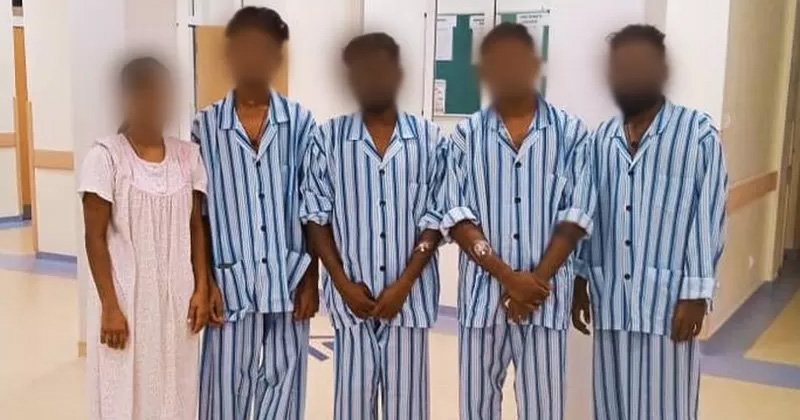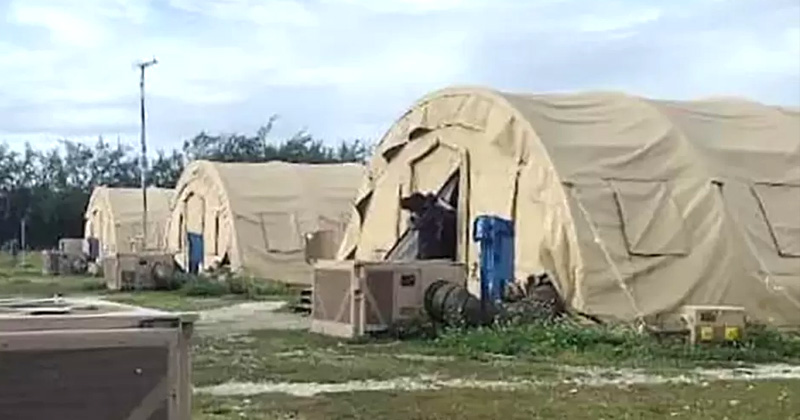A group of migrants has been marooned for several months on a minuscule British territory located in the Indian Ocean after being rescued from their distressed fishing boat. Eager to find refuge in a safe place, they describe the conditions on the island as unbearable. However, due to the unique legal status of the island, they feel frightened and helpless.
In October 2021, a fishing boat was spotted struggling near Diego Garcia, drawing immediate attention from the island's authorities. Diego Garcia is home to a covert UK-US military base, situated hundreds of miles away from any other populated area, where unauthorized visitors are strictly prohibited.
It soon became apparent that the 89 individuals on board were Sri Lankan Tamils, claiming to be fleeing persecution, and had no intention of landing on the island. Their original plan was to seek asylum in Canada, substantiated by maps, diary entries, and GPS data found on board. However, rough weather and engine problems diverted them off course. As their boat encountered difficulties, one passenger revealed that they were desperately searching for the closest place of safety. "We spotted a glimmer of light and started sailing towards Diego Garcia," he recounted.
A Royal Navy vessel escorted the boat to land, and the group was placed in temporary accommodation. However, that was 20 months ago, and the migrants, who have endured a dire situation leading some to attempt suicide, are still stranded. Communications between officials on the island and London shed light on the reasons behind their prolonged stay.
Initial messages discussed plans to "investigate repair options for the engine" but acknowledged the possibility that the group would attempt to seek asylum from Diego Garcia. The following day, this scenario became a reality. The Tamils presented a letter to the British forces commander on the island, stating that they were escaping persecution, having departed from Tamil Nadu in India 18 days earlier, and expressing their desire to be relocated to a safe country.
Many of the migrants claim to have connections with the former Tamil Tiger rebels in Sri Lanka, who were defeated in the civil war that ended in 2009, and allege experiencing persecution, including instances of torture and sexual assault.
An official "information note," approved by Paul Candler, the director of overseas territories in London, noted that the "unexpected arrival" of the group marked the first time asylum had been sought on the British Indian Ocean Territory (BIOT), the official name of the islands. It stated that if approached by the media, the official "defensive line" would be to acknowledge that the UK government was "aware of the incident" and "working urgently to resolve the situation."
As time passed, more boats arrived on Diego Garcia while messages were exchanged with London. The number of individuals in the camp, estimated by lawyers to have reached at least 150 at one point, swelled as additional migrants arrived from Sri Lanka.
As the harsh reality of their situation sank in, the asylum seekers began to comprehend the dire circumstances they found themselves in. Lakshani, one of the migrants, revealed to the BBC last month that her initial relief of survival and access to food quickly dissipated as the tropical island refuge turned into a living nightmare. According to Lakshani, she was sexually assaulted in October of the previous year by a man who had traveled on the same boat and was housed in the same tent as her. Despite her screams for help, no one came to her aid.
When she mustered the courage to make an official complaint, Lakshani claims she was informed that gathering evidence would be challenging as she had washed her clothes. Shockingly, she was forced to remain in the same tent as her alleged attacker for almost a week until authorities finally acted upon her demand to have him relocated. The UK government and the administration of BIOT did not respond to requests for comment regarding this allegation.
Lakshani and other migrants shared that they or individuals they knew had attempted suicide or engaged in self-harm due to the suffocating conditions. Some resorted to swallowing sharp objects in an act of distress. Lawyers working with the migrants have documented at least 12 suicide attempts and allegations of two sexual assaults within the camp.

"We are mentally and physically exhausted... We are living a lifeless life. I feel like I am living like a dead man," expressed Vithusan, another migrant, who admitted to self-harming on two occasions. Aadhavan, who had his initial protection claim rejected, disclosed that he had "lost all hope" and attempted to take his own life, unwilling to remain confined on the island indefinitely.
Shanthi, a woman among the stranded migrants, revealed that her husband had also attempted suicide. Lakshani attributed her own suicide attempt to an officer at the camp who threatened to send her back to Sri Lanka, where she claimed to have been raped and tortured by soldiers in 2021.
Requests for comment on specific claims were unanswered by the UK government and G4S, the private security company responsible for guarding the migrant camp. G4S stated that its officers treated migrants with "dignity and respect at all times," while a spokesperson for the UK government emphasized the importance of the "welfare and safety" of migrants on BIOT, adding that all allegations of mistreatment were taken seriously and fully investigated. The BIOT administration was said to be providing extensive medical support.
Furthermore, hunger strikes involving children have also taken place on the island, as confirmed by lawyers assisting the migrants.
Lawyers representing the stranded migrants have reported that earlier this year, the BIOT commissioner allegedly confiscated the migrants' phones, restricted access to the communal telephone, and withheld medical treatment unless the individuals agreed to sign a form absolving the BIOT administration of certain liabilities. However, the BIOT administration has refuted these claims in court documents, stating that measures were taken, such as removing sharp objects from the camp, in response to a hunger strike to prevent self-harm.
It is widely acknowledged that the Diego Garcia military base was not intended to serve as a facility for housing asylum seekers. In 1965, Britain assumed control of the Chagos Islands, including Diego Garcia, from Mauritius, resulting in the expulsion of over 1,000 inhabitants to make way for the military base. Mauritius, which gained independence from the UK in 1968, maintains its sovereignty over the islands, and the United Nations' highest court has ruled the UK's administration of the territory as "unlawful" and called for its cessation.
The UK had resisted international pressure to engage in talks regarding the islands until late last year when negotiations were finally agreed upon. The Diego Garcia base has been utilized for military purposes, including launching airstrikes on Afghanistan and Iraq, and there have been reports of it being used as a CIA "black site" for the interrogation of terrorism suspects.
According to court documents filed in London, the makeshift migrant camp consists of tents that were previously designated as COVID-19 isolation facilities for military personnel. The camp is enclosed by fences, and inside, basic medical facilities and a canteen are available. G4S guards must accompany the migrants whenever they leave the designated area. Shanthi described the situation as being confined in a cage, lacking freedom.

Lawyers representing the migrants have stated that basic education became available about a year ago, but classes have occasionally been conducted outdoors due to a rat infestation. Some migrants have returned home, either due to giving up their asylum claims or facing rejections. Others have attempted to sail to Reunion Island, a French territory in the Indian Ocean, in hopes of seeking asylum there.
Presently, at least 60 Tamils remain stranded on the island, awaiting decisions regarding their fate or challenging previous rulings in complex legal processes unfolding thousands of miles away in the UK. While the UK is bound by international laws governing the treatment of refugees, these laws do not apply to BIOT, which is considered "constitutionally distinct and separate from the UK."
A separate process has been established based on the principle that no one should be returned to a country where they face torture or inhumane treatment. This process determines whether the migrants should be sent back to Sri Lanka or to a "safe third country." Lawyer Tessa Gregory from Leigh Day, a London-based firm, has initiated a judicial review on behalf of several asylum seekers on Diego Garcia, challenging the fairness and legality of this process.
According to testimonies, decisions regarding the return of some migrants to Sri Lanka were made based on hastily conducted initial interviews, while subsequent more comprehensive interviews were marred by translation errors. Others have been left in a state of uncertainty as the UK government has yet to identify a suitable "safe third country."
In response, the UK government stated that the BIOT administration was assessing the migrants' protection claims in accordance with BIOT law and international legal obligations.
The UK branch of the United Nations refugee agency (UNHCR) expressed concerns about the deteriorating health situation on Diego Garcia and requested access from UK authorities, which has not been granted so far.
Emilie McDonnell, UK advocacy and communications co-ordinator at Human Rights Watch, urged the British government to consider all available options to ensure the welfare of the asylum seekers, who are on British-controlled territory and should therefore be protected by the government.
Lawyers have stated that the UK has declared it will not accept any of the approved asylum seekers from Diego Garcia.
Three of the Tamils who arrived on the island are currently in Rwanda receiving medical treatment after being evacuated due to self-harm and suicide attempts. Their transfer is unrelated to the agreement between the British and Rwandan governments to relocate some asylum seekers from the UK to Rwanda. The BIOT administration, informed one of the individuals that they would arrange and cover the cost of private accommodation and therapy during their treatment in Rwanda. However, the letter also stated that if the individual was not satisfied with the proposal, the only other option available at that time was to return to Diego Garcia.
Four of the asylum seekers have had their requests to be sent to a "safe third country" approved. A letter seen by the BBC, addressed to one of them two months ago, assured that efforts would be made to expedite the process. The UK government emphasized its commitment to working tirelessly with the BIOT administration to find a long-term solution for the migrants' current situation.
However, the situation for everyone involved may continue to drag on without a clear timeframe for identifying a safe third country, and lengthy legal procedures await those contesting their rejections. After enduring a 20-month wait, one asylum seeker expressed the prevailing sentiment of hopelessness among the group.